Film of the Week: Call Me by Your Name
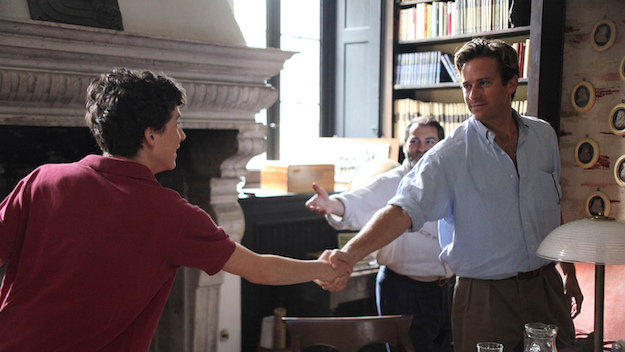
Now this is what you call a truly cultured family evening. One night in their Italian villa, 17-year-old Elio (Timothée Chalamet) hunkers down on the sofa with his parents, (Amira Casar and Michael Stuhlbarg), and Mom reads aloud a passage from what we’re told is a “16th-century French romance.” Mom’s copy happens to be in German, so she spontaneously translates for them into English. This is the rarefied environment in which Luca Guadagnino’s Call Me by Your Name is set, a world in which beautiful and/or flawlessly erudite people spend balmy summer days and nights, fall in love, ponder on the vagaries of life, in and around a stately Italian villa, while almost invisible domestics—at least, they’re occasionally glimpsed, but have next to no dialogue—tend to their needs, cooking, gardening, or presenting them with handsome, freshly caught fish.
I run the risk of seeming puritanical or Loachian in saying that this masters-and-servants arrangement is one of the things that troubles me about Guadagnino’s undeniably alluring, almost universally praised film. But the director is surely aware that his drama takes place in a sealed little globe of stately privilege. I missed the line in which Casar’s character names the book, but the French romance in question is presumably something along the lines of L’Astrée or La Princesse de Clèves (both novels from the 17th century, in fact). Whatever the work may be, its mention in the film makes it clear that, just as in early French fiction, the amours of these characters take place in a privileged, heightened realm, a world of nobles and elevated souls, in which servants—and indeed, most forms of harsh economic reality—are likely to be absent or obscured. Lest the leisured luxury of his film raise our political hackles, Guadagnino is apparently notifying us that his film too belongs in a sphere of its own; those are simply the terms of the story. It’s a fairy tale, a fable, a romance in every sense. It’s essentially a piece of pastoral, set in a gilded, unreal-seeming Arcadia—unreal because seen through the perspective of idealizing memory.
Guadagnino has already proved himself to be a master of high romance, treated altogether unironically and located in lofty settings: I Am Love (Io sono l’amore, 2009) was a story of forbidden love mounted in a register somewhere between Visconti and grand opera, and set in the loftiest environs of Milanese high society. That film sent me into a state of swooning admiration of the kind that people seem to be feeling for his new film; I also liked Guadagnino’s considerably lighter follow-up A Bigger Splash (2015). But while I appreciate its virtues and the sheer elegance and confidence of its filmmaking, Call Me by Your Name rather leaves me cold.
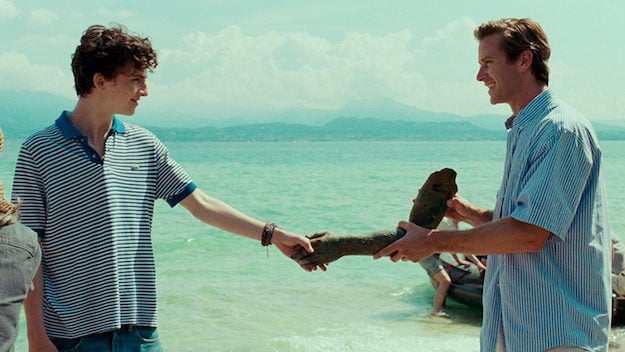
Scripted with ostentatious erudition by James Ivory, no less, and based on a 2007 novel by André Aciman—who plays an eccentric bit part—Call Me By Your Name is a gay male love story, but there’s something entirely universal about its story of unalloyed mutual desire between two people. The setting is a villa somewhere amid the rural splendour of Northern Italy, and the year is 1983. Elio spends holidays there with his parents, each summer bringing a visit from a different student, there to work with Elio’s father, a classics professor. This year’s guest is Oliver (Armie Hammer), a coolly self-contained American, somewhat older than Elio (the actual age difference between the two actors is 10 years). Oliver’s insouciant self-confidence clearly derives from his combination of high erudition—he thinks nothing of, practically on arrival, engaging with the professor in a duel of etymology about the derivation of the word “apricot”—and the looks of an Adonis. Burnished, noble of countenance, as if specifically designed as a stately ornament for the gardens of Lombardy, he resembles the Roman statues that the professor studies—one of which, in a scene of euphoric calm, is hauled up from the waters of Lake Garda to the rippling accompaniment of a John Adams piano piece.
Elio himself is no slouch; apart from knowing exactly how many people died in the Battle of the Piave in 1809, he’s a virtuoso who’s able to sit down at the piano and bash out a piece of Bach “the way Liszt would have played it,” then another variation, the way Busoni would have played Liszt’s version (do Ivory and Guadagnino realise how often they make us want to slap their characters?). But he’s also diffident, still a virgin, and at once coddled and overlooked by his parents, who come across as rather purringly pleased with their own classiness. Things initially look bad for Elio when golden god Oliver arrives: not only does he have to give up his bedroom for him, he loses his father’s attention, the newcomer even usurping Elio’s customary front seat in the family car.
Elio has every reason to hate Oliver—not least his coolly dismissive way of putting an end to every conversation by saying “Later” from behind his impenetrably chic sunglasses, before drifting off on his own mysterious business. But it eventually becomes clear that Elio is feeling a stronger emotion: we see him writhing on his bed with Oliver’s swimming trunks over his head, inhaling deeply, an image that nicely encapsulates the film’s sometimes comic cocktail of lust, restlessness and summer boredom. Both Oliver and Elio distract themselves, or perhaps deceive themselves, by having liaisons—in Oliver’s case a haughty flirtation, in Elio’s something more intense—with local girls. They’re really foremost on each other’s minds, although Oliver initially tries gently but firmly to resist Elio’s advances.
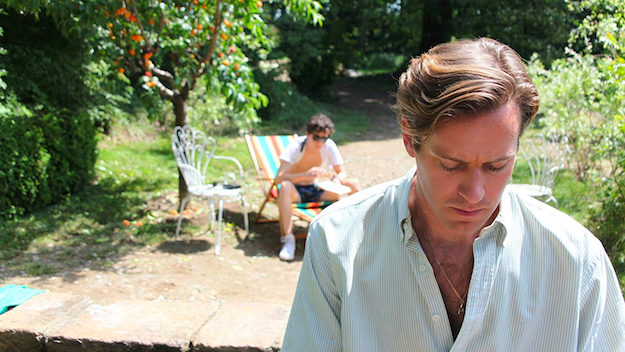
Eventually, they satisfy their passion—and the film leads up to this moment tantalizingly, with an anxious Elio waiting around at night for Oliver’s return home, to one of the film’s delicate, yearning songs by Sufjan Stevens. The lead-up to their midnight tryst is nicely handed, Elio obsessing about the time all day, nervously glancing at his watch even while getting intimate with Marzia, a very keen girl of his own age.
Despite what you’d normally expect in such a narrative, the consummation of the boys’ desire is neither a climax nor an ending: Elio’s hormones are so stirred by their first night together that he’s moved to further satisfy himself with a fresh peach. This moment has, perhaps unsurprisingly, become notorious overnight, and the shot of the mashed-up fruit on a sideboard, yielding a slow trickle of Elio’s sperm, might almost seem like a John Waters kind of scabrous, if not for the sureness with which Guadagnino shifts the tone of the scene. “You’ve moved onto the plant kingdom now?” teases Oliver, walking in on him. But this moment of succulent farce ends poignantly in Elio’s tears.
Call Me by Your Name sees Guadagnino picking up on the register of bucolic eroticism that was a thread in I Am Love and making it the basis of an entire film. He acutely catches a certain melancholic ambivalence about desire, especially in the context of first love—notably the way Elio displaces his feelings onto Marzia (Esther Garrel, recently seen in her father Philippe’s Lover for a Day, and here extremely affecting). What’s evoked is a potent admixture of impatience, unease, ecstasy, and nausea that’s arguably part and parcel of youthful desire (it’s notable that the last idyllic interlude between the boys ends with Elio puking). This is a profoundly sensual film, finding an erotic charge in practically everything it surveys, but especially where body parts are involved: a close-up of a foot in cool, sunlit water; the two men’s feet side by side on a bedroom floor; or, in a telling bit of metonymy, shots of their swimming trunks separately hanging up to dry. The same eroticism is there in the sound. The music, especially the passages from Adams—whose catalogue was so brilliantly used in I Am Love—gives the sometimes languorous drama sudden bursts of urgency, as if Elio’s passion were constantly undergoing a series of sporadic, abrupt awakenings. The urgency is there too in the occasional clatter of doors in the big, cavernous house. The atmosphere suggests Chekhov, with southern sunlight and nervously concealed hard-ons.
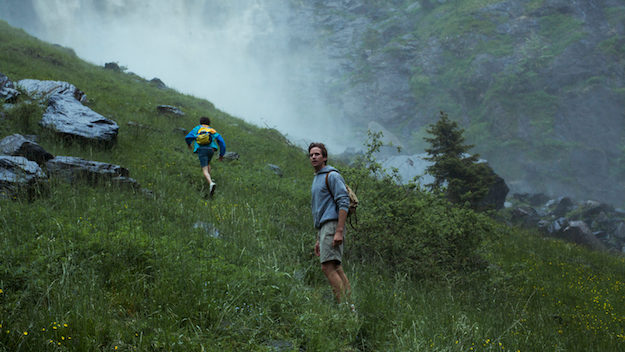
The overall mood put me in mind of Joseph Losey’s The Go-Between, perhaps because Guadagnino too suggests that “the past is another country”—although this past is closer to us than Losey’s tainted Edwardian idyll. Call Me by Your Name, it must be said, does the early ’80s better than just about any film I’ve seen. Italian viewers of the right age will be able to judge whether it hits the spot in its references to the period’s politics and the Bettino Craxi government, but for most of us, the accuracy will ring true in small cultural details: the Peter Gabriel and Robert Mapplethorpe posters in Elio’s room, the glaring acidic colours of his rucksack, the self-conscious awkwardness of the three young moderne types, vaguely New Romantic small-town poseurs that the boys meet on a trip, with the girl stiffly dancing (not so much poised as anglepoised) to the Psychedelic Furs.
Guadagnino’s use of time is singularly liquid, as befits a film that explicitly alludes to Heraclitus and his notion of time as a river. The action flows elusively from one moment to the next: Oliver has no sooner arrived in Italy than he’s already a much-loved fixture at the local bar’s poker table. Time’s passing is denoted by the fact that, every time we see Elio, he’s holding a different paperback; he’s either a phenomenally voracious reader or he’s throwing them away after one chapter (but then, this was an age in which kids didn’t have cellphones to distract them).
This is a highly elegant film in every way, rich in grace notes, and superbly acted. Chalamet crackles with a watchful, sly nerviness, and Hammer carries himself with a radiant, imperious confidence that sometimes softens to show a more humorous gentleness in Oliver: at one point, when the lovers are exchanging confidences about the first time they took a fancy to each other, Hammer’s voice takes on a sweet, flirtatious kind of throaty gurgle. And, whether or not you buy the somewhat on-the-nose Polonius-like dispensing of flawed wisdom that is the Professor’s show-shopping solo moment, Stuhlbarg is also very good as a patriarch who knows more about the vagaries of desire than these young folks might think.
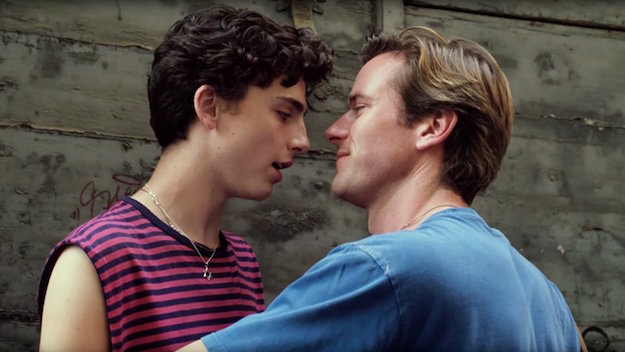
We also have here—at a time when social media is buzzing with condemnations of multiple shades of the “inappropriate”—something very unusual, an entirely non-judgmental film about a young person’s sexual relationship with a rather older lover in which there’s no suggestion of exploitation or abuse, and no dramatic need for guilt or punishment.
One of the odder things about the film, though, is the sense that somehow Guadagnino is, consciously or otherwise, disparaging or disavowing his own Italianness. Despite his name, Elio comes from a family that’s not Italian but a Jewish blend of American, Italian and French, in which speech is constantly slipping between English and the other two languages; strangely, too, he speaks French with Marzia, who’s presumably Italian although she’s played by a French actress, as is Oliver’s makeshift squeeze Chiara (Victoire du Bois). Not only does the internationally cast film not remotely come across as an Italian movie, but it depicts its Italian characters in a cavalier or even mocking way. If the local Italian population, Marzia and Chiara apart, aren’t servants or the extras glimpsed in the bar, they’re cartoonish eccentrics, like the bony duo of lunch guests who babble simultaneously about Craxi, Bunuel and what you will to the amusement of Elio’s family.
In one scene Elio and Oliver, on a bike trip, stop off at a house to ask an old lady for a glass of water. She has a framed picture of Mussolini hanging above her door. “That’s Italy,” comments Elio. But what’s Italy exactly? Here, it’s a prettified backdrop for the emotional adventures of people who are essentially tourists—something you might expect from one of James Ivory’s own films but hardly from Guadagnino, whose I Am Love was so fascinating because it explored an altogether new variant on the cinematic representation of modern Italian identity.
But the biggest problem for me is the way that the film’s aesthetic perfection militates against its emotional charge (although I know many viewers won’t agree). The world depicted here is so glossily perfect that this feels like a film less about life than about lifestyle—not unlike a similar long-hot-Italian-summer movie, Stealing Beauty by Bertolucci (the subject of a 2013 documentary by Guadagnino and editor Walter Fasano). What Guadagnino mounts for us is an extended ravishment in an entirely ravishing world. Yet the characters’ beauty and intellectual perfection is so consummate that I couldn’t entirely believe that these people actually had genitals—that they could ever sweat or incur sunburn. Those splashes of sperm must have come from somewhere, though, unless they’re just the juice of a highly exclusive and refined strain of Lombardy peach.
Jonathan Romney is a contributing editor to Film Comment and writes its Film of the Week column. He is a member of the London Film Critics Circle.







